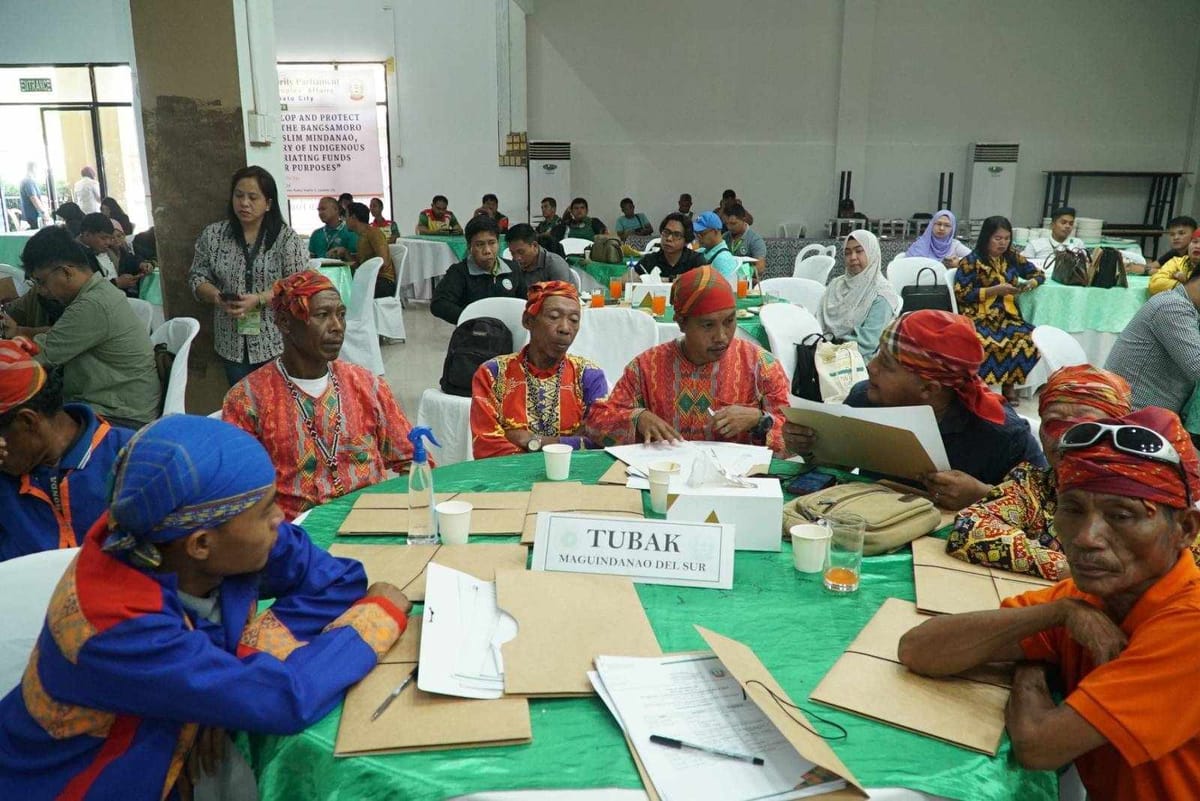IP groups in BARMM seek empowerment, state-run tribal university

Source: Rappler
Author: Herbie G
COTABATO CITY, Philippines - In a rallying cry for empowerment, organized indigenous peoples (IPs) in the Bangsamoro Autonomous Region in Muslim Mindanao (BARMM) called on the region's parliamentarians on Thursday, May 9, to expedite the passage of two bills. The bills, seen as essential for the empowerment of IPs in the Muslim-majority region, aim to strengthen ancestral domain protection and establish the first state-run tribal university in BARMM.
BARMM is home to IP groups such as the Tedurays, Lambangian, Dulangan Manobo, Erumanun Ne Menuvu, Higaonon, Blaan, Sama Dilaut, Sama Jama Mapun, Sama Bangingi, Sama Pangutaran, and Yakans.
The Consortium of Bangsamoro Civil Society (CBCS) and Teduray-Lambangian Women's Organization Incorporated (TLWOI) made their positions known at the start of a series of public hearings on Bangsamoro Transition Authority (BTA) Bills 273 and 274, which were simultaneously held in Cotabato City and Upi, Maguindanao del Norte, on Thursday.
BTA Bill 273 seeks to strengthen the protection, promotion, and preservation of IP ancestral domains in the BARMM. It also aims to officially recognize the IPs' distinct political structures, tribal practices, justice system, and cultural identities in the predominantly Muslim region.
The other proposed regional law, BTA Bill 274, aims to convert the state-owned Upi Agricultural School in Upi town, Maguindanao del Norte, into the Bangsamoro Tribal University for Indigenous Education. If approved, the institution would become the first state-run IP university in the BARMM.
BTA Member Ramon Piang Sr., a Teduray who is working for the tribal university, said the conversion would increase the quality of education and would mean more funds, teachers, and students from various IP communities in the BARMM.
"Our locals will no longer need to look for better schools elsewhere," Piang said.
Guaimel Alim, CBSC chairperson, said it was about time that the BARMM regional government uphold and officially recognize the distinct cultural and political way of life of the IPs in the Muslim-majority region regardless of religion.
According to Alim, BARMM's IPs should also enjoy their right to self-determination.
"We believe that providing the enabling environment, including political authority, for the indigenous people to govern themselves in their communities, according to their way of life, will make a difference," Alim said.
BTA Bill 273, or the proposed IP Code, "recognizes the holistic nature of ancestral domains, [indigenous] peoples' rights to ownership, self-determination, equitable resource-sharing, and territorial residence," among others.
Doohan Mokudef Guid, leader of the TLWOI, told participants in the public hearing in Cotabato City that her group sees the proposed IP Code as crucial because "this will protect us from encroachments on our ancestral land rights."
IP groups supporting the bills cited cases of land disputes involving IPs and what they said was the marginalization of Menuvu, Higaonon, and other IP communities in areas like Wao town in Lanao del Sur.
In South Upi, Maguindanao del Sur, tensions have been brewing due to attempts to convert an ancestral land of a Teduray community. A watershed area there is being turned into a mining exploration site, a move strongly opposed by IPs, environmentalists, and civil society groups.
The IPs also raised concerns because local conflicts were threatening their security.
A week before the public hearings, tribal leader and Indigenous People's Mandatory Representative Timuay Juanito Promboy of Datu Hoffer Ampatuan town, Maguindanao del Sur, was killed in an ambush carried out by gunmen on a motorcycle.
IP groups said they suspected Promboy was killed because he was advocating for the rights of Tedurays.
"His killing was an attack on the entire Teduray tribe in Maguindanao del Sur," said BTA Member Froilyn Mendoza, a known advocate for IP women's rights.
BARMM officials said IP communities have repeatedly become victims of displacement in the hinterlands of Maguindanao del Sur as a result of conflicts which, at times, involve IP causes.
"That is why our aim is to protect, empower, and provide them with sustainable development. It is, in a way, strengthening the fruits of the peace process," said Kadil Sinolinding, another BTA member. -Rappler.com
